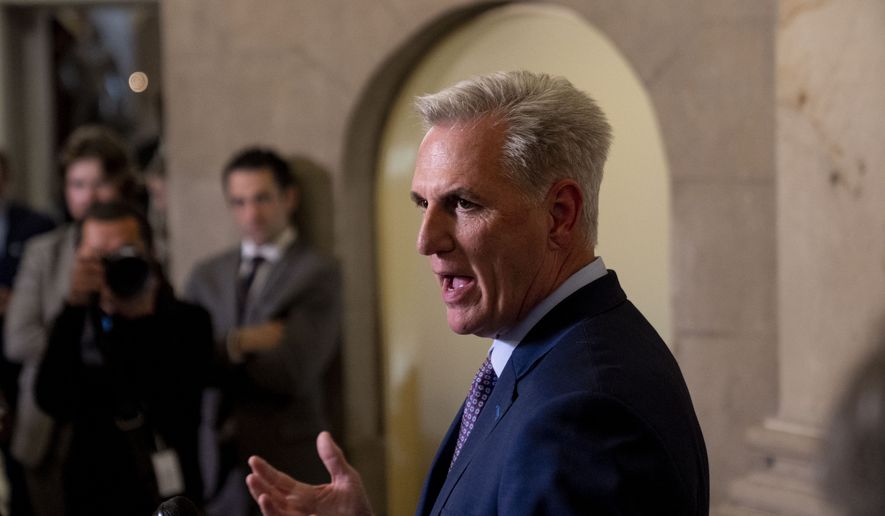The White House and congressional leaders punted a planned debt limit meeting Friday to next week as staffers worked behind the scenes on a proposed deal, people familiar with the decision said.
President Biden is exploring whether agreeing to some spending cuts would unlock Republican opposition to raising the debt ceiling. Congress faces a June 1 deadline to increase the maxed-out $31.4 trillion debt limit or face default and a potential economic meltdown.
Asked by reporters at the Capitol why the high-stakes meeting was canceled Thursday, House Speaker Kevin McCarthy said: “Ask the White House.”
He later said all parties canceled the meeting because of insufficient progress to warrant another sit-down.
“The White House didn’t cancel the meeting,” said Mr. McCarthy, California Republican. “All the [congressional] leaders decided it’s probably in the best of our interest to let the staff meet again before we get back together. … I don’t think there’s enough progress for leaders to get back together.”
He said one of the congressional leaders also had a scheduling conflict Friday and would not have been able to attend the meeting.
White House officials described the postponement as a sign of progress and said talks would continue. They said Mr. Biden and Mr. McCarthy are expected to meet early next week.
The fast-approaching deadline spurred the flurry of activity between the White House and Capitol Hill.
Treasury Secretary Janet Yellen warned that the U.S. would be forced to pick and choose which bills to pay if the debt limit is not raised by June 1. The fiscal crisis, she said, would almost certainly trigger a stock market downturn and possibly a global economic disaster.
The president, the speaker and other congressional leaders met Tuesday to discuss the debt limit standoff. It was the first time in months that Mr. Biden and Mr. McCarthy had a sit-down.
They agreed to a follow-up meeting.
Administration officials have met twice with aides to Mr. McCarthy since Tuesday to discuss a path forward.
House Republicans are pushing for the debt limit proposal they passed last month to serve as a blueprint for the talks. The bill proposed rescinding at least $90.5 billion in unspent coronavirus relief, expanding work requirements for welfare and capping federal spending.
They also want the final product to include an overhaul of the permitting process for energy projects.
“If you look at this package, it represents the most commonsense, straightforward approach to addressing the spending problem that got us here as we confront the debt ceiling,” said House Majority Leader Steve Scalise, Louisiana Republican.
Mr. Biden has signaled that gutting provisions from his signature $739 billion climate and health care law is a non-starter. The debt limit proposal that House Republicans passed last month sought to claw back at least $200 billion from the bill’s green energy tax credits.
“They say they were spending too much giving tax breaks to people who are moving to renewable energy,” said Mr. Biden. “It has nothing to do with anything other than that oil companies don’t like it.”
Democrats want a debt ceiling that would last until at least after the 2024 election to give Mr. Biden breathing room as he seeks reelection.
“It’s got to go out two years. We can’t be going through hostage-taking constantly,” said Sen. Gary C. Peters, Michigan Democrat. “The more time we have so we don’t have people acting irresponsibly and causing chaos in the markets and raising the costs for Americans. We should take that option.”
A two-year deal is a tough sell for House Republicans, who would lose leverage to extract further spending cuts from Mr. Biden in next year’s budget process. Rep. Garret Graves, Louisiana Republican, said a yearlong extension is preferable with the right mix of spending cuts.
“If the White House could show that … they have an earnest intent to begin lowering the amount of spending to begin putting us on a sustainable financial trajectory, that we can do one year,” Mr. Graves said. “I think the speaker of the House would be more than happy to come back and have the same debate next year.”
Mr. Graves, an ally of Mr. McCarthy, said a two-year deal might be acceptable if Democrats are willing to cap future spending growth and agree to larger cuts.
Although the White House and House Republicans remain far apart, they are beginning to shape the outlines of a deal.
Rescinding unspent coronavirus relief is a likely area of compromise. House Republicans have long called for the move, and Democrats have indicated that they are open to the idea.
“We should be talking about extending the debt ceiling until after the election, reclaiming unused covid funds and discussions about discretionary spending without touching Social Security, Medicare, or defense,” said a statement by Rep. Jared Moskowitz, Florida Democrat.
As the White House and congressional Republicans discuss spending cuts, Democrats insist that the talks are separate from the debt ceiling. They say the debt limit should be increased regardless of any agreement.
Senate Majority Leader Charles E. Schumer, New York Democrat, said the staff from the White House and congressional leaders are laboring on a constructive way forward, “but that progress should not and cannot be tied to default.”
Correction: A previous version of this article misspelled the first name of Rep. Garret Graves of Louisiana and incorrectly reported the home state of Rep. Jared Moskowitz.
• Haris Alic can be reached at halic@washingtontimes.com.
• Jeff Mordock can be reached at jmordock@washingtontimes.com.




Please read our comment policy before commenting.